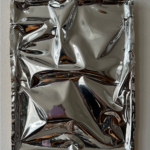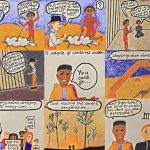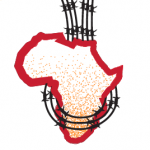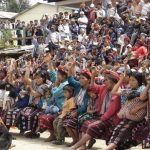by Alisha Archie
From the Text: “In ‘Unsettling the Coloniality of Being/Power/Truth/Freedom’, Sylvia Wynter (2003) argues that during the Renaissance, the West invented a new definition of what it means to be human which provided the foundational basis of modernity…Wynter’s (2003) argument builds on Franz Fanon (among others) who in ‘Black Skin, White Masks’ (2008) – focusing on the Black colonial experience, particularly in the Antilles where he grew up – recognizes through a self-reflective, psychological lens that the European colonial powers systematically erased and suppressed authentic Black identities and instead imposed racist, inferior identities on the colonized…Finally, I have deliberately chosen to leave remnants of the fixture visible around the edges of the Mirror for Nonwhite Peoples as a poignant reminder that the new descriptive statement of the human, Man, is fabricated.”
Category: decoloniality
Women’s Struggle in Biafra: The Nigerian Civil War as a Direct Consequence of Colonialism
by Carolin Felden. Main Article in German language.
Between 1967 and 1970, Nigeria was engulfed in a devastating war between the Nigerian government and the secessionist Republic of Biafra. The war concluded nearly three years later with Nigeria’s victory, yet it left in its wake a staggering toll of over two million lives lost. Notably, the role of women in the Biafran struggle was multifaceted; they emerged as warriors, scholars, farmers, and providers, playing a crucial role in sustaining the republic during its tumultuous existence. While commonly referred to as the “Nigerian Civil War,” this article contends that such terminology inadequately captures the war’s broader context. The legacy of British colonialism in Nigeria (1914-1961) is posited as a significant factor contributing to the war’s outbreak (cf. Richardson 2019: 79). Consequently, this article seeks to elucidate that the Biafran quest for independence was not merely a confrontation with the Nigerian government but rather a profound struggle against neocolonial foreign domination. Special emphasis will be placed on the indispensable contributions of Biafran women to this cause.
Glossary of the Institutionalized Regime of Underdevelopment
by Lisanna Kelz, Aikaterini Mouzaki, Zanê Aradine and Isabel Pearce
A Glossary narrating the Institutionalized Regime of Underdevelopment: A critical reflection of the market-oriented international order, reproducing neocolonial exploitation patterns. The glossary is divided into three sections: Institutions; Country Groupings, Unions and Organizations; and Terms of Economic and Financial Governance…
The Border Regime
by Lisanna Solara Kelz
The author about the Border Regime project: “The intent of this project is to approach the Border Regime in a rather non-scientific way and show how the Border operates, functions, works and is reproduced every day. Therefore, I try to give an overview and insight on the different ways the border appears in and beyond our daily live, within our state and beyond its official borders. I chose Prezi as a design where everyone can look at the topics they are interested in and chose the order in which they want to explore them…”
Norms of Beauty in India Fair is Beautiful: A legacy of Colonialism and Globalization
by Khesraw Majidi This paper describes and analyzes the norms of beauty in India by considering the whiteness of people’s skin, Caucasian looks, body shape, and its impact on social status. The paper also analyzes the relationship between skin color,Continue reading… Norms of Beauty in India Fair is Beautiful: A legacy of Colonialism and Globalization
Colonial Legacies – German Volunteer Tourism in Namibia
by Dimitra Dermitzaki
This paper aims at addressing the appropriateness of young “Westerners” when participating in projects of volunteer tourism, inter alia supported by governmental and state funds, while also discussing the complexity of Germany’s refusal of the formal recognition of its committed genocide and reparation payments.
Comic Strip “WHO KNOWS?”
by Tania Plunkett
While studying the subject, “The Invention of Africa,” which was based on V.Y. Mudimbe’s book of the same name, I was struck by the parallels I see in my own country, Australia, regarding the historical and present-day perceptions of Aboriginal and Torres Strait Islanders (ATSI). During my school years through the 1980s and 90s, schools taught Australian colonial history as “Australian history” and painted colonists largely as explorers and heroes. Indigenous histories were mostly excluded or simplified, and ATSI perspectives almost never included.
A magazine of critical perspectives on the G20 summit. Or: The Summit of Colonialism?
by Annika Basten, Dshamilja Roshani, Emmanuel Dahan, Vanessa Lee, Yasmine Bakr
Concerning our aim to break out of academic contexts, it made sense for us to use the form of a magazine as it it allows various media approaches and makes space for conversation with a diverse audience due to its accessible nature. It also provides the possibility to generate, share and discuss information in a digital and physical form. We decided to use the G20 Summit as a focal point as it reflects current political, economic and social processes. We found that public discourse about the G20 often failed to provide firstly general information about the summit itself and secondly explanations for the motivations behind the protests against it, including its whole diversity and controversies. Therefore, we wanted to make this knowledge accessible by summarizing basic information about the G20 before proceeding with our own criticism about the G20 summit. We hope to create alternative narratives – not only by opposing the labelling of G20 protests as useless, destructive and purely violent actions, but also by presenting a different view on the “partnership with Africa” and all its related topics.
Bleeding Latin America the “Nice” Way: Canadian Mining in Latin America
by L. M. K.
In fact, companies are protected by trade agreements which allow them to sue local governments when the latter take action to protect local communities. For instance, “Canada has played an active role in changing regulations governing Colombia’s energy sector in ways that favour Canadian companies,” with neoliberal trade deals which protect investors at the expense of the populations. The local governments are accused of lacking surveillance of the situations where Canadian mining companies operate, without care for the local water sources and populations’ displacements.
Photojournalism and Objectivity – The World Press Photo Contest (2017)
by Catriona Miller and Adèle Brailly
This project is a critique of the World Press Photo Contest from a postcolonial perspective. We state that photojournalism is part of a wider power discourse: colonial tropes are reproduced by depicting a poor and miserable other, in opposition to developed Western people. The very aim of the World Press Photo Foundation is to show what is happening worldwide, in the name of freedom press, freedom of expression, and freedom of speech. But what about the voice of the photographed people? Is it actually necessary to show violent images? Does it raise social awareness? The questions of empathy and dignity of the victims seem to be relevant in a context of continuous information.









